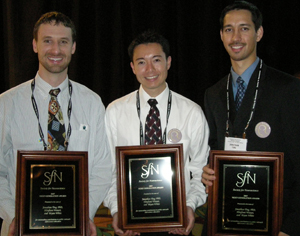UW Graduate Students Win First Next Generation Award For Promoting Public Awareness about Neuroscience Education

A group of University of Washington graduate students promoting awareness about neuroscience education has won the first annual, prestigious “Next Generation Award” from the Society for Neuroscience. Neurobiology & Behavior Community Outreach, a student organization composed entirely of UW graduate students who volunteer their time, is devoted to neuroscience education and community outreach. The organization has created interactive hands-on demonstrations, videos, and other media for schools about the importance of neuroscience education. As part of the award, the group received $2,000 for continued outreach activities.
Three Neurobiology & Behavior graduate students founded the organization: Bryan White, Hirofumi Watari and Jonathan Ting (right). More than 30 graduate students have volunteered with the group in 2007. In addition, several faculty have given support, most notably Dr. Eric H. Chudler, Director of Education and Outreach of the Department of Bioengineering.
“The students’ work establishing Neurobiology & Behavior Community Outreach has created the foundation for neuroscience-community interaction within the Puget Sound area that will last for years,” Chudler says.
The goals of the student organization mirror those of the Society for Neuroscience and the worldwide Brain Awareness Week (BAW) campaign: promote public awareness, understanding and dialog about the progress and benefits of brain research, with special emphasis on reaching out to K-12 science teachers and students.
To sustain their work long-term, the group created a website and became an official UW organization in 2006. Since then, students in the group have participated in the BAW Open House, conducted classroom visits, and participated in science fairs and discussion panels on research and peer-mentoring programs.
With almost 38,000 members, the Society for Neuroscience has 117 chapters, including 16 outside the U.S., devoted to enhanced understanding of the brain and the central nervous system, and to inform the public about the nature of scientific discovery.
Additional Facts about Neurobiology & Behavior Community Outreach
- The concept for the organization began in 2006 with a grant proposal to the UW President’s Learning for Leadership Council, which awarded the necessary funds to help create the organization and offer outreach activities in the first full year of operation.
- In 2007, more than 30 UW graduate students volunteered from the Graduate Program in Neurobiology & Behavior. Nine additional volunteers represent six different departments affiliated with the Graduate Program.
- Students have produced many impressive multi-media outreach tools: interactive exhibits about the brain, a video-embedded poster, and “how-to” video demonstrations. The videos are available for viewing or download from the group’s website.